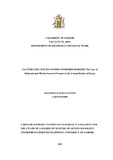| dc.description.abstract | Seaweed farming is a new concept recently introduced in the south coast of Kenya and has been practiced for 7 years with the purpose of assessing its performance and commercialising the activity targeting the global market. This has seen the Kenya Marine and Fisheries Research Institute conduct feasibility research in the past fifteen years. Policies have also been effected to guide the implementation of the pilot projects and offer regulation for environmental conservation and equity in the use of Marine resources.
The purpose of the study was to investigate the factors influencing women entrepreneurship while focusing on a case study of seaweed farming in Kwale County. The objective was to determine the extent of seaweed farming as an economic activity among women entrepreneurs, to establish the impact of seaweed farming on the livelihoods of the women farmers and determine whether Seaweed farming has the potential to sustain livelihoods of sea dependent communities. The study adopted the Diffusion of Innovation Theory by Rogers, Social Exchange Theory by Gouldner and Sustainable Livelihood Approach.
This case study applied a descriptive research design. The target population was 287 women seaweed farmers. The study employed Purposive Sampling and Stratified random sampling method to sample 100 respondents. Structured questionnaires were developed and utilised in this study. Data from the questionnaires was analysed using Microsoft Excel. Inferences from analysed data were made and these were used to answer the research questions. Standard tables were used to present the information from which interpretation was done by comparing the frequencies and percentages.
The study findings revealed that after the adoption of seaweed farming; some farmers continued to conduct other businesses to supplement their income while others totally stopped other ventures. Earnings from seaweed farming helped to better satisfy farmers socio economic needs. Findings also showed that up to 94 % of the respondents had been trained on book keeping and records. However, only a half of these were able to keep records. Sensitisation about the availability of funds for women and loans was directly proportional to those who applied for loans (63%). The study revealed that product marketing, access to credit and provision of equipment are the main areas which need improvement in seaweed farming. A majority of the respondents (56%) intend to diversify and venture into other businesses.
The study concluded that skills acquisition through training is important for the improved performance of seaweed farming. The study recommends that interested stakeholders, and investors should introduce other business ventures in the area for the women to complement the farming activity while offering trainings and close supervision. Create awareness on business opportunities, available easy-to-access credit facilities and government initiatives for women empowermen; ICT integration, networking and online marketing should be initiated for better communication while installing supportive infrastructure for the women entrepreneurs. | en_US |



